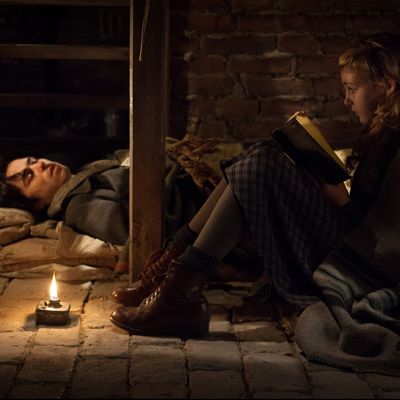
It shouldnÔÇÖt strike anyone as odd that a film about Nazi Germany would be narrated by the Grim Reaper. But one does get a distinct chill in the opening scenes of The Book Thief, hearing the dulcet tones of Roger Allam (Game of Thrones) over images of clouds, assuring us of ÔÇ£one small fact┬áÔÇö youÔÇÖre going to die.ÔÇØ Then the camera plunges to the earth and begins to track through a train rushing across the German countryside; it eventually settles on our heroine, 9-year-old Liesel Meminger (Sophie N├®lisse), as she watches her younger brother die. The Book Thief opens with one death and ends with dozens, and right there you can see its main challenge: telling a heartwarming story, possibly an inspiring one, amid so much mortal sorrow. ItÔÇÖs not easy. ÔÇ£When the time comes, donÔÇÖt panic,ÔÇØ the Reaper quietly advises us. ÔÇ£It doesnÔÇÖt seem to help.ÔÇØ
Liesel has been taken from her mother and placed with a German couple, Hans and Rosa Hubermann (Geoffrey Rush and Emily Watson). At first, they seem like a mismatched pair: The accordion-playing Hans is a gentle, meek fellow, while Rosa seems brittle, unforgiving. (ÔÇ£Where is the boy?ÔÇØ she sternly asks when the girl arrives without her now-dead brother. ÔÇ£They promised us two children, with two allowances!ÔÇØ) Hans reads to the illiterate Liesel, and begins to teach her to read and write in his basement, scrawling new words all over the walls in chalk. Together, theyÔÇÖre creating and reclaiming words while outside, the world is destroying them: Hans is a housepainter by profession, but nowadays he spends much of his time erasing words and names from signs. ÔÇ£The scraping-off business is picking up,ÔÇØ he says at one point, as he scratches away at the name ÔÇ£GoldsteinÔÇØ on a storefront.
The Book Thief uses the miniature world of Himmel Street, where the Hubermanns and their neighbors live, to tell a broader story of hidden truths, of ordinary peopleÔÇÖs resistance (and acquiescence) to evil. ItÔÇÖs a tale of unremarkable people doing (at times) remarkable things┬áÔÇö in other words, pure Hollywood. But The Book Thief itself is an unremarkable movie, telling a familiar, even tired tale. ItÔÇÖs based on the widely beloved international bestseller by Markus Zusak. That, too, is narrated by Death. Not having read the book, I canÔÇÖt tell if this sly approach to point of view feels more thought through in ZusakÔÇÖs original. But here, it comes in and out, as if every once in a while the filmmakers needed something to distinguish their story from all the other wartime coming-of-age tales.
ThereÔÇÖs a good idea here, something about the redemptive power of words and stories. Occasionally, the film nails it┬áÔÇö as when we see Liesel invent a story, on the spot, inside a bomb shelter, about a ghost boy and his living sister who describes to him the world. And, of course, thereÔÇÖs Death, his smooth words harbingers of the fact that eventually heÔÇÖll claim us all. (The Reaper consistently gets the best scenes in the film┬áÔÇö including a final montage and reverie thatÔÇÖs touching, albeit in predictable ways.) The acting is good, too: We already know to expect stellar work from Rush and Watson, and they deliver here as well┬áÔÇö particularly the latter, who has to convincingly play a kind, strong woman convincingly playing a soulless harpy.
But thereÔÇÖs a whole lot of thin box-checking here, too. Liesel becomes fascinated by, and somewhat enamored of, a young Jew, Max (Ben Schnetzer), whom the Hubermanns hide in their basement; the relationship never really comes alive for us. And DeathÔÇÖs narration at first suggests something more inventive┬áÔÇö a delicate walking of a fine line, perhaps, between the playful and the profound, the kind of thing filmmakers like Michael Powell and the Taviani Brothers excelled at. But director Brian Percival (Downton Abbey) and screenwriter Michael Petroni (The Voyage of the Dawn Treader) donÔÇÖt make the imaginative leaps necessary to pull that off. At one point, we see images of Kristallnacht, intercut with Liesel and her schoolmates being made to sing at school (something about how they ÔÇ£donÔÇÖt create brotherhood pacts with Jews or non-Germans,ÔÇØ of course). It should hit us in the gut, but it doesnÔÇÖt, especially since weÔÇÖve seen this juxtaposition of violent horror with children singing in approximately 8,493 other films already. We keep waiting for something eye-opening, and we rarely get it. By and large, The Book Thief is serviceable, sleek, and stodgy.


